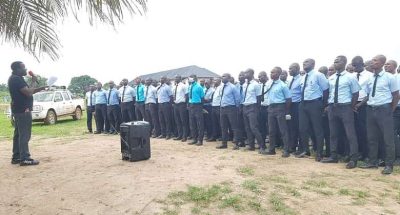Mr Eric Adu, the Ahafo Regional Director of the National Commission for Civic Education (NCCE) has advised police personnel to study and make them
Mr Eric Adu, the Ahafo Regional Director of the National Commission for Civic Education (NCCE) has advised police personnel to study and make themselves conversant with the 1992 Constitution.
He said the constitution remained the supreme document that guided the operations of the service, saying until the service personnel were abreast with the content, they would always be found wanting in the course of the national duties.
Mr Adu gave the advice when addressing police recruits undergoing training at the Police Training School at Kenyase in the Asutifi North District of the Ahafo Region, as part of activities to mark the commemoration of the 30th Anniversary of the 1992 Constitution, organised by the commission.
He emphasised that the 1992 constitution remained the supreme law of the land, saying “as new recruits into the police service, you must endeavour to study and acquaint yourself with all the 299 Articles and the Two Schedules in the constitution”.
Taking the recruits into the content of the constitution, Mr Adu explained the first schedule of the constitution dealt with transitional provisions (section one to 37), while the second schedule contained the forms of oaths.
He explained the constitution was undoubtedly the bedrock for Ghana being an icon of political stability in the Sub-Saharan Region, saying as compared to her neighbours, Ghana seemed to be going through a period of relative national political stability.
“This unprecedented event in Ghana occurred amid civil wars and violent conflicts in Liberia, Sierra Leone, Guinea and more recently Côte d’Ivoire, Burkina Faso, Nigeria and Mali”, he said.
He emphasised the 1992 constitution was the brain behind peaceful change overs of political power from one political party to another in the country which had made Ghana gained international recognition and admiration.
“The constitution has been able to safeguard the possibility of turning Ghana into one party state as it happened in 1964.
Article 3(1) of the constitution states that “Parliament shall have no power to enact a law establishing a one-party state”, he stated.
Despite these democratic gains and three decades of stability, Mr Adu regretted that the constitution had been criticised for loopholes that had impeded its effectiveness in yielding the country’s expected good governance and development aspirations.
Aside repeals and amendments of some few non-entrenched provisions in1996 through the Constitution of the Republic of Ghana (Amendment) Act, 1996, (Act 527), the country has not been able to successfully amend the 1992 Constitution to consolidate her democratic gains, despite two major attempts over the past decade, he noted.
He said attempts at constitutional amendments failed due to a lack of bi-partisan consensus and public support, saying achieving consensus would require setting up a multiparty and multidisciplinary committee to facilitate consensus building, especially with opposition parties.
This would help insulate the process from partisan control and influence and build trust among stakeholders.
Mr Adu therefore called for comprehensive public education and engagements with all stakeholders to achieve broad-based public support required changes in the constitution.

COMMENTS